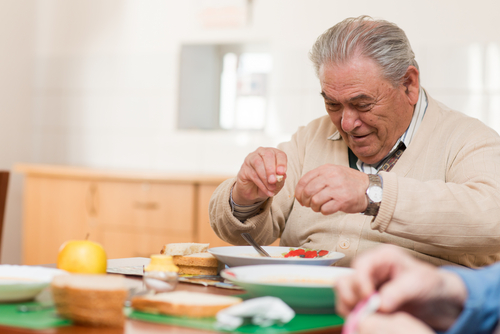Forgetful in Old Age: Elderly Forgetfulness
Category:

Thanksgiving is over, and we have all returned to our busy lives in anticipation of the upcoming holiday season. Home for the holidays is the place most of us want to be. When you reflect on your time at home this Thanksgiving, are the following thoughts crossing your mind more than Dad’s lost glasses or the pumpkin pie Mom forgot to bake?
My mom is forgetting things, my dad is forgetting things, and I am worried.
Are your parents experiencing old-age forgetfulness, or is it dementia? Forgetfulness in elderly people happens, but merely talking on the phone or texting can be deceiving. Staying with your parents in their home can be a real eye-opener.
Being forgetful in old age is something we can work on. Mind-challenging activities and implementing simple lifestyle changes make a big difference when it comes to enhancing memory.
But what if your parents don’t respond to these changes, or forgetfulness makes it impossible to carry out the activities of daily living?
Dementia, forgetting family members, or old people forgetting to bathe, eat, or how get home after a neighborhood walk are all symptoms you should report to the doctor to seek a mental health evaluation.
Let’s identify the difference between an old person forgetting things and the onset of dementia.
What causes forgetfulness in old age, and how is it different from dementia?
In many cases, an old person forgets things simply due to a lack of focus. We’re busy and multi-taskers, so we all forget things. If you see your mom frantically searching for her glasses, and you notice that they’re on top of her head, there is no reason to panic.
But if your mom picks up her glasses and places them in the fridge or tries to put them on her foot, you should be concerned.
Old people forgetting a friend’s address or a grandchild’s birthday is not unusual. But if they don’t recognize the grandchild or don’t remember that the dear friend passed away 3 years ago, it may be symptomatic of dementia.
If Dad repeats himself from time to time, go with it. But if he asks you who you are when you walk into the room, it’s time to be concerned.
Memory loss that disrupts daily life is not a part of normal aging. If you notice a gradual decline in memory and reasoning skills, it’s time for an assessment.
So, what can we do to help ourselves or our loved ones stay focused?
- Engage in physical activity. Take a daily walk, join an exercise class, do some yoga.
- Socialize often. Join the local senior center or book club.
- Get plenty of sleep.
- Stay mentally active. Read, text your grandkids, and use the computer for brain-training games.
- Do mind stimulating activities such as crossword puzzles, playing scrabble, or sudoku (the popular number game)
- Eat a healthy diet.
- Plant a garden.
- Sign up for a class such as painting, music, or whatever you might be interested in.
- Follow a daily routine.
- Put your items, such as your wallet, keys, and purse in the same place every day.
Download Our Early Signs of Dementia Guide
Aging can be challenging, but forgetfulness in old age doesn’t have to slow you down. Keeping your body and mind in the best shape possible will help you maintain a good quality of life and allow you to be mentally and physically active in retirement.
If your loved one is showing signs of mental decline or dementia, our staff at Griswold Home Care can make it easy for you to get the care you need when the time is right. Contact us for more information.
Subscribe
Date: December 14, 2022
Category:


